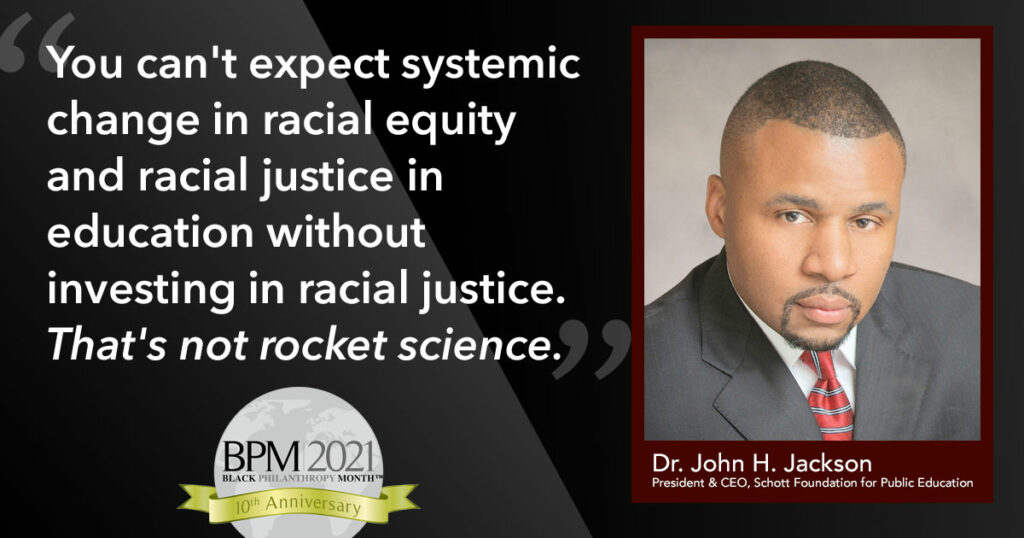Blog
“It’s Not Rocket Science”: Centering Racial Justice in #BlackPhilanthropyMonth

Earlier this month, Schott Foundation President & CEO Dr. John H. Jackson spoke at the opening event for Black Philanthropy Month. Held each August since 2011, this 10th anniversary Black Philanthropy Month is a time not only to celebrate Black giving but also critically examine how much further the philanthropic sector needs to move toward racial equity and racial justice.
When event moderator Bakari Sellers asked what challenges philanthropy faces in moving more resources to Black communities and organizations, Dr. Jackson emphasized the importance of relationships and trust in determining where funding goes:
So here’s what we know. We know, number one, if you put money in the hands of Black people it’s more likely to be converted to philanthropy and more likely to benefit Black communities. Number two, we know that philanthropy works by two things: relationships and trust. The challenge is the majority of philanthropists don’t have the relationship with Black-led organizations or Black communities to extend those resources. And that’s where the Schott Foundation comes in. As a public foundation we serve as an intermediary to connect philanthropists with grassroots communities.
And secondly, where those relationships exist, many of the philanthropic organizations are not working from a space of trust: trusting to give organizations the money unrestricted and trusting enough to make long-term investments. We’re seeing some of that change with the investments that Mackenzie Scott has made, the Chrysalis Fund, the Jobin-Leeds family, but we’re definitely going to need to see more of that if we’re going to progress in the future.
You can’t expect systemic change in racial equity and racial justice in education without investing in racial justice. It’s not rocket science.
Beyond direct funding of programs, Dr. Jackson brought up the point that despite how large the philanthropic sector is as a whole, federal, state and local outlays completely dwarf it. That should lead funders to develop strategies to leverage their private dollars into public policy change:
Philanthropy’s best business model to address structural racism is to use our private dollars to get a larger public investment, definitely in the U.S. So where philanthropy and foundations commit billions of dollars each year, publicly, federal, state, and local dollars is hundreds of billions of dollars. So as such, as the Biden Administration has now moved billions of dollars through the American Rescue Plan, and there’s another trillion dollars coming through the infrastructure, philanthropy cannot sit on the sidelines… These are over a trillion dollars being spent, something that we won’t see likely for another generation. So it’s up to philanthropy to ensure that these dollars are spent toward closing the racial equity gaps and bringing about racial justice.
Watch additional remarks by Dr. Jackson at the Black Philanthropy Month kickoff:
Black Philanthropy Month was founded by Dr. Jacqueline Bouvier Copeland for Reunity, formerly the Pan-African Women’s Philanthropy Network in August 2011.


